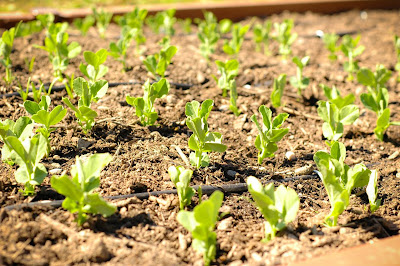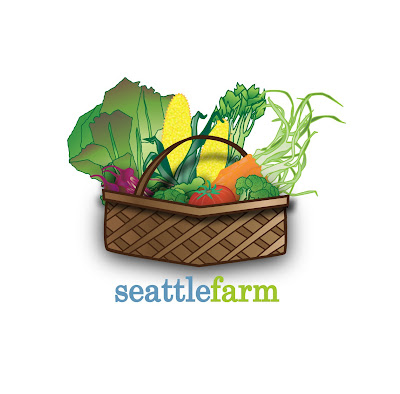With the world getting smaller, and cities and populations growing larger, we as global citizens need to be concerned about our food and where it is sourced. Finding locally grown food - and organic - is one sure way to cook and eat responsibly. I've recently found the Coolest Concept, put together by SeattleFarm. SeattleFarm focuses on growing a sustainable Seattle. How is this done? I was lucky enough to sit down and chat with Grant Jones, the Founder of Seattle Microfarm, LLC. We talked about vegetable gardens, community, and sustainable urban farming. Here's what he had to say...

WE: Please tell us about SeattleFarm...
GJ: seattlefarmTM is a service developed by Seattle MicroFarm, LLC in order to create a sustainable local food system, cultivate organic food where it will be consumed, and enrich our community and its residents.
The seattlefarmTM service consists of vegetable garden installation and vegetable garden maintenance. If you decide you'd like to dedicate a section of your garden to our CSA (Community Supported Agriculture) program, we'll grow your vegetables for free! By incentivizing the development of an urban agricultural infrastructure (backyard vegetable gardens), we are turning the asphalt jungle into a place of organic food production.

WE: What was the genesis of SeattleFarm?
GJ: seattlefarmTM was born as a solution to the problem of our food system's reliance on fossil fuels both in the production and transportation of food. By growing food where it will be consumed and using nothing but human hands (and hand tools), we are eliminating the need for fossil fuels.

WE: Are there urban farms, globally? Is this a new concept or something that has historical precedents?
GJ: Urban farms are not new, though recently there has been a surge in urban farming in the USA as people come to terms with the environmental impact of our current food system, as well as the high price of organic foods in local supermarkets.

WE: How can the concept and implementation of sustainable urban farming change the world?
GJ: By growing food locally, we impact the world in a positive way by reducing carbon emissions. By reducing each individual's carbon footprint (the average American presently emits a staggering 19.66 tons of CO2 per year), we are taking our first steps towards a sustainable earth. We hope that our goal of "Growing a sustainable Seattle" will inspire others to take on the challenge of environmental sustainability.

WE: What do you imagine the future of urban farming to be, globally?
GJ: We foresee urban farming spreading rapidly over the course of the next 5-10 years. As the demand for local, organic food grows, an increasing number of organizations like seattlefarmTM will rise to the task. The simple fact is that you cannot get more local than your backyard. Zero emissions is the only truly sustainable option.
WE: Is urban farming a realistic aspect for international development?
GJ: Absolutely! Many countries have long since discovered the usefulness of urban farming, such as Cuba, India, Thailand, China, and Egypt. Turning to land that has already been developed is infinitely better than developing new land for agricultural use.
WE: Is there anything else you'd like to share with us?
GJ: Growing vegetables isn't difficult! While it takes a certain level of expertise to maximize the production of a given space, anyone can cultivate a small plot of vegetables with some success, given that they are passionate about growing food locally and have a desire to learn! Oh, and vegetable gardening is FUN!

WE: Grant, thanks so much for sharing your enthusiasm for urban farming - it is inspirational! I hope that many communities reach out and organize in this way - it can truly make a difference.
For more information, please see:
www.seattlefarm.com
